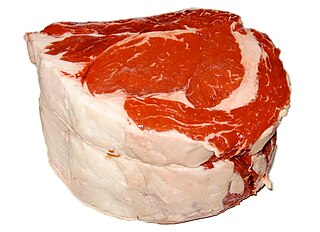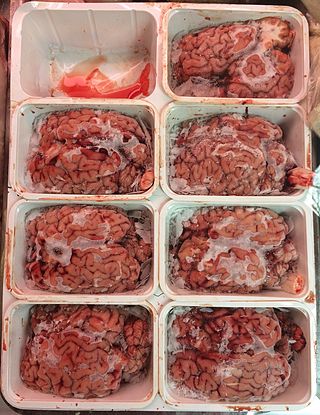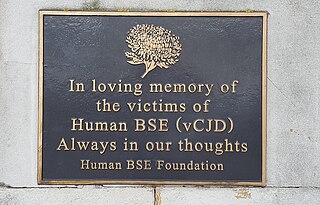
Beef is the culinary name for meat from cattle.
Transmissible spongiform encephalopathies (TSEs) are a group of progressive and fatal conditions that are associated with prions and affect the brain and nervous system of many animals, including humans, cattle, and sheep. According to the most widespread hypothesis, they are transmitted by prions, though some other data suggest an involvement of a Spiroplasma infection. Mental and physical abilities deteriorate and many tiny holes appear in the cortex causing it to appear like a sponge when brain tissue obtained at autopsy is examined under a microscope. The disorders cause impairment of brain function, including memory changes, personality changes and problems with movement that worsen chronically.

A downer is an animal, usually livestock, that cannot stand on its own and therefore is to be killed. A downed animal, one that is unable to stand, is not necessarily a downer.

Mechanically separated meat (MSM), mechanically recovered/reclaimed meat (MRM), or mechanically deboned meat (MDM) is a paste-like meat product produced by forcing pureed or ground beef, pork, mutton, turkey or chicken, under high pressure through a sieve or similar device to separate the bone from the edible meat tissue. It is sometimes called white slime as an analog to meat-additive pink slime and to meat extracted by advanced meat recovery systems, both of which are different processes. The process entails pureeing or grinding the carcass left after the manual removal of meat from the bones and then forcing the slurry through a sieve under pressure. This puree includes bone, bone marrow, skin, nerves, blood vessels, and the scraps of meat remaining on the bones.

Creekstone Farms Premium Beef, LLC is an American beef processing company located in Arkansas City, Kansas.

Beef brains and veal or calf's brains are used in the cuisines of France; Italy; Spain; El Salvador; Mexico, etc. where they are called sesos in Spanish and are eaten in tacos and quesadillas; Pakistan and Bangladesh, where they are known in Urdu and Bengali as Maghaz; Portugal; and Indonesia.

Variant Creutzfeldt–Jakob disease (vCJD), commonly referred to as "mad cow disease" or "human mad cow disease" to distinguish it from its BSE counterpart, is a fatal type of brain disease within the transmissible spongiform encephalopathy family. Initial symptoms include psychiatric problems, behavioral changes, and painful sensations. In the later stages of the illness, patients may exhibit poor coordination, dementia and involuntary movements. The length of time between exposure and the development of symptoms is unclear, but is believed to be years to decades. Average life expectancy following the onset of symptoms is 13 months.
Catholic Priests' Association for Justice is a South Korean association of Catholic priests, whose aim is to establish justice in Korea.

The 2008 US beef protest in South Korea was a series of protest demonstrations made between 24 May 2008 and mid August 2008. against president Lee Myung-bak in Seoul, Korea. The protest involved several hundred thousand and at its height up to one million people. The protest began after the South Korean government reversed a ban on US beef imports. The ban had been in place since December 2003, when mad cow disease was detected in US beef cattle.
United States beef imports in Japan were a contentious issue in Japan–United States relations after BSE was detected in a steer in Washington. After multiple beef import restrictions in Japan, the United States and Japan struck a trade deal to lift the beef import ban in May 2019. Exports of U.S. beef to Japan totaled almost $2.4 billion in 2021.

Bovine spongiform encephalopathy (BSE), is an incurable and invariably fatal neurodegenerative disease of cattle. Symptoms include abnormal behavior, trouble walking, and weight loss. Later in the course of the disease the cow becomes unable to function normally. There is conflicting information about the time between infection and onset of symptoms. In 2002, the WHO suggested it to be approximately four to five years. Time from onset of symptoms to death is generally weeks to months. Spread to humans is believed to result in variant Creutzfeldt–Jakob disease (vCJD). As of 2018, a total of 231 cases of vCJD had been reported globally.
The Virus-Serum-Toxin Act or VSTA was United States Federal legislation designed to protect farmers and livestock raisers by regulating the quality of vaccines and point-of-care diagnostics for animals. Initially, the Virus-Serum-Toxin Act was created due to significant losses from unregulated manufacture and distribution of anti-hog cholera serum. The Act's intended purpose is to ensure the safe and efficient supply of animal vaccines and other biological products. The United States Secretary of Agriculture is responsible for licensing and regulating the manufacture, importation, and exportation of affected agents. The act and its applicable guidelines are managed by the Animal and Plant Health Inspection Service (APHIS) of the United States Department of Agriculture (USDA).
The United States Department of Agriculture’s Agricultural Marketing Service (AMS) initiated the Beef Export Verification (BEV) Program in August 2003 as a voluntary, user-fee funded service. Under BEV, U.S. exporters desiring to sell beef to Japan can apply for BEV certification from AMS after satisfying a list of requirements enabling the agency to verify the origin of the beef. The program was in response to Japanese officials’ demands that the United States verify that none its beef exports were of Canadian origin, in the wake of the May 2003 discovery in Canada of a cow with bovine spongiform encephalopathy (BSE). After the December 2003 discovery of a BSE cow in the United States, Japan was among the first of the many countries to suspend some or all imports of U.S. cattle, beef and related products, so the future of BEV was clouded.
The term Feed ban is usually a reference to the regulations that have prohibited the feeding of most mammalian-derived proteins to cattle as a method of preventing the spread of bovine spongiform encephalopathy (BSE). Feeding of infected ruminant material back to ruminants is believed to be the most likely means of transmission of the disease.

Meat on the bone, also called bone-in meat is meat that is sold with some or all of the bones included in the cut or portion, i.e. meat that has not been filleted. The phrase "on the bone" can also be applied to specific types of meat, most commonly ham on the bone, and to fish. Meat or fish on the bone may be cooked and served with the bones still included or the bones may be removed at some stage in the preparation.
The status of United States beef imports has been an issue in Taiwan–United States relations. Controversy has centered on cases of bovine spongiform encephalopathy, and the use of ractopamine as an additive in feeds.

Richard Westgarth Lacey was a British microbiologist and writer, known for arguing that Bovine spongiform encephalopathy "mad cow disease" can be passed to humans.

The United Kingdom was afflicted with an outbreak of Bovine spongiform encephalopathy, and its human equivalent variant Creutzfeldt–Jakob disease (vCJD), in the 1980s and 1990s. Over four million head of cattle were slaughtered in an effort to contain the outbreak, and 178 people died after contracting vCJD through eating infected beef. A political and public health crisis resulted, and British beef was banned from export to numerous countries around the world, with some bans remaining in place until as late as 2019.

The Beef Bones Regulations 1997 were a statutory instrument of the British government that limited the sale of beef on the bone. The regulations were implemented as a response to the United Kingdom BSE outbreak over fears that variant Creutzfeldt–Jakob disease in humans might be caused by the consumption of dorsal root ganglia, which lie near the bone. As well as beef on the bone, all beef-bone derived products were prohibited from sale. This had the effect of outlawing T-bone steaks, prime ribs and oxtail as well as some soups and stocks. Other aspects of the regulations dealt with the deboning of beef and the keeping of records in the food production industry. The restrictions on sales were lifted in December 1999 and the regulations as a whole were revoked in April 2008.











